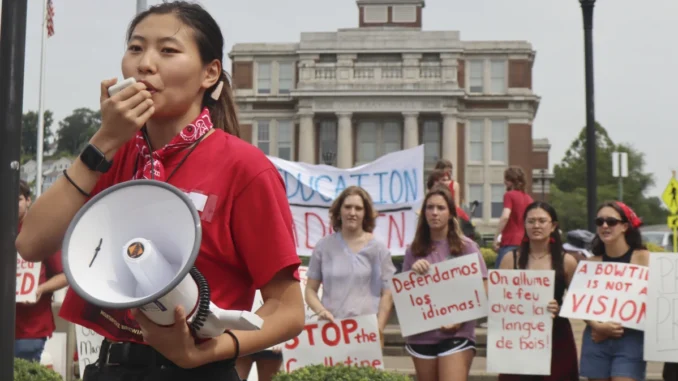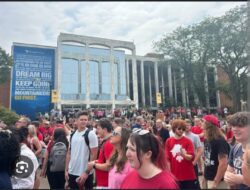
**Peace Protests Erupt at West Virginia University: Students Voice Concerns Amidst Claims of Fabricated News**…
*Morgantown, WV* – Tensions flared at West Virginia University (WVU) as students organized peaceful protests across the campus, demanding greater attention to issues they feel are not being adequately addressed by the administration. These protests, which began early last week, have brought to the forefront concerns about university policies, student well-being, and the need for a stronger commitment to diversity and inclusion.
The protestors, a diverse group of students, faculty members, and community activists, have taken to the university’s iconic campus landmarks, such as the Mountainlair and the Woodburn Circle, to express their collective frustrations. Holding signs that read “Education for Peace,” “Support Our Voices,” and “Equal Opportunities for All,” students are calling for an administration that listens and responds to their demands for reform.
**Student Voices: A Call for Change**
The heart of the protests centers around several issues that students feel are crucial to their academic and personal lives. One of the major grievances raised has been the ongoing concerns about mental health resources on campus. Students argue that mental health support services are overwhelmed and underfunded, leaving many with long wait times for counseling and other forms of assistance.
“We are paying thousands of dollars to attend this university, and yet we can’t access the support we need when it matters the most,” said Olivia Henderson, a senior psychology major and one of the protest organizers. “This isn’t just about mental health—it’s about the university prioritizing our well-being over their bottom line.”
Alongside mental health, students have also voiced their frustrations regarding inclusivity and diversity initiatives. Protestors are demanding that the university take more concrete steps to foster a welcoming environment for all students, particularly those from marginalized communities. Critics argue that the current diversity programs are largely performative, lacking true impact or tangible changes that would make students from diverse backgrounds feel genuinely supported.
“WVU prides itself on its history and heritage, but it’s time to recognize that our future lies in embracing a diverse and inclusive community,” said Raymond Thomas, a junior political science student and another vocal advocate in the protest. “We are not asking for special treatment. We are asking for fairness.”
**Administration’s Response: “Rumor” and “Not Real”**
In a surprising twist, university officials have downplayed the protests, claiming that reports of unrest on campus have been exaggerated. WVU’s communications office issued a statement earlier this week, labeling the ongoing protests as “rumors” and “not real.” According to the statement, the protests have been exaggerated by social media posts and certain campus groups, creating a false narrative about widespread student dissatisfaction.
“The university is aware of some isolated incidents and gatherings, but there is no widespread unrest at WVU,” said Kelsey Wallace, a spokesperson for the university. “Our administration remains committed to addressing all student concerns in a constructive manner and has held multiple town halls to engage directly with students. The idea that there is a systemic issue on campus is simply not true.”
The response from WVU has done little to quell student outrage, with many protesters accusing the administration of downplaying serious issues affecting the student body. According to several protest leaders, the university’s attempt to dismiss their grievances only highlights the disconnect they feel with the administration.
“They’re pretending like these problems don’t exist,” said Rachel Simmons, a senior sociology major. “By calling this a rumor, they’re telling us that our struggles don’t matter. How can we trust them to solve our problems if they can’t even acknowledge that they exist?”
**Wider Implications: Campus Climate and Public Opinion**
The situation at WVU is part of a larger trend at universities across the country, where students are becoming more vocal about the issues that affect their daily lives. From mental health and diversity to academic transparency and financial burden, students are increasingly demanding accountability and reform from their universities.
For some, the peaceful protests are a sign that WVU is in a moment of reckoning. “It’s about time the students are speaking up,” said Dr. Jessica Adams, a political science professor at WVU. “Historically, college students have been at the forefront of social movements, and it’s clear that the current generation is no exception. The administration would be wise to listen to what these students are saying.”
On the other hand, some members of the public and local media have expressed concerns that the protests may be more about social media-driven hype than actual concerns. Some have suggested that the university is being unfairly portrayed as an institution in crisis. “It’s always difficult to gauge the reality behind the headlines,” said local reporter James Calloway. “A lot of what’s being reported is coming from social media accounts, which can sometimes amplify things beyond what’s actually happening.”
**Looking Ahead: Can Dialogue Bridge the Divide?**
As the protests continue, it remains unclear whether WVU’s administration will engage meaningfully with the demands of its students. While the university has scheduled another round of town halls to address some of the issues raised, many students remain skeptical. “We’ve been to enough town halls to know that nothing changes,” said Thomas. “We need action, not just talk.”
Despite the administration’s efforts to downplay the protests, the fact remains that the students’ concerns are very real to them. Whether the protest will lead to tangible change or become just another moment in a long history of student activism remains to be seen. What is certain is that the students of WVU are making their voices heard, and they are demanding to be taken seriously.


Leave a Reply